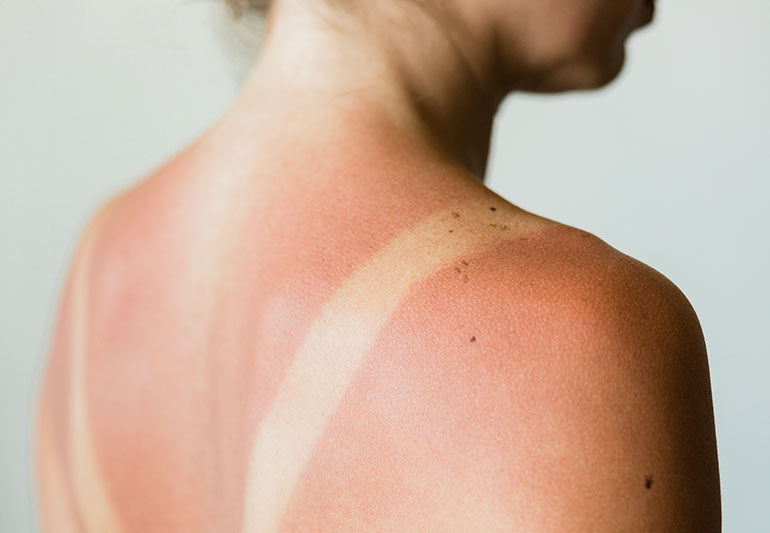

Plenty of us have suffered an accidental sunburn. Maybe you didn’t plan to be outdoors and neglected the sunscreen; maybe you didn’t reapply later in the day, or you just missed a spot.
Whatever happened, your skin is hot, throbbing and lobster-colored. Now what? Dermatologist Melissa Piliang, MD, talks us through how to get rid of sunburn — and how to prevent it next time.
Reduce your skin’s temperature
First things first: “Get out of the sun right away and get your skin cooled down,” Dr. Piliang advises. “Take a cool bath or shower to bring the temperature of your skin down.” This helps reduce inflammation. Make it short, though — excessive time in the water dries out your skin.
If your burn only affects a smaller area, you can cool it down using a cold compress, like a wet towel or washcloth. Gently place it on the burn until your skin feels cooler to the touch.
Get (and stay) moisturized
While your skin is still wet, apply a moisturizer cream or lotion to help seal in moisture, Dr. Piliang says. In the first few days after the initial burn, apply moisturizer frequently to limit dryness.
Just be sure not to moisturize your skin until it has cooled off, or you’ll trap heat and cause more pain and inflammation.
Relieve the pain
To relieve pain or burning, try the following home remedies for sunburn:
- Apply cooling aloe vera gel for immediate sunburn relief.
- For itching, try a thin layer of 1% hydrocortisone cream.
- Keep using those cool compresses, too. They feel great and provide some relief from the burning sensation.
- Don’t hesitate to pop a pain reliever if you’re really hurting. “You can take something for the inflammation, like ibuprofen, naproxen or aspirin,” Dr. Piliang says.
Call your doctor if you have blisters over a large area, you’re in a lot of pain, or you’ve developed a fever, chills, dizziness or confusion.
Keep yourself hydrated
Sunburns draw fluids away from other parts of your body to your skin, which can quickly dehydrate you. When helps a sunburn, then, is hydration.
“It’s really important to make sure you’re hydrating well,” Dr. Piliang says. “Drink a lot of water. Sports drinks that replenish electrolytes can also help.”
What not to do for a sunburn
Just as important as what you do for your sunburn is what not to do:
- Skip ointments and petroleum jelly, which trap heat.
- Avoid topical treatments ending in “-caine,” like benzocaine and lidocaine, which can cause allergic reactions that can worsen your inflammation.
- Pass on any creams that include alcohol, which will dry out your skin and make it harder to heal.
- Don’t touch those sunburn blisters! To prevent infection and scarring, let blisters heal on their own.
Preventing accidental sunburn
So what can you do to minimize your chance of getting a sunburn the next time you’re caught without your sunscreen? “Find shade,” Dr. Piliang says. “That can really help.”
You can also carry your shade with you. She recommends keeping a hat in your car (and ideally wearing one any time you’re out in the sun). Tightly woven fabric is best, as is a brim that’s two to three inches wide so it protects your face, ears and neck.
Consider stashing protective clothing in your car, too. It’s a good habit to wear loose-fitting, long-sleeved shirts and long pants when you’re in the sun, though white clothing isn’t as protective as darker colors. As with hats, the tighter the weave of the fabric, the more protection you’ll get. “You can also buy shirts that have SPF in them at big-box stores for an affordable price,” Dr. Piliang suggests.
If you can’t make the investment in new clothes, you can wash the ones you already have in a treatment designed to boost their natural ultraviolet protection factor (UPF) from UPF 5 to UPF 30. Simply add the treatment to your normal laundry cycle, and it’ll last for 20 washes.
more recommended stories
 Anxiety Reduction and Emotional Support on Social Media
Anxiety Reduction and Emotional Support on Social MediaKey Summary Anxiety commonly begins in.
 Liquid Biopsy Measures Epigenetic Instability in Cancer
Liquid Biopsy Measures Epigenetic Instability in CancerKey Takeaways Johns Hopkins researchers developed.
 Human Antibody Drug Response Prediction Gets an Upgrade
Human Antibody Drug Response Prediction Gets an UpgradeKey Takeaways A new humanized antibody.
 Pancreatic Cancer Research: Triple-Drug Therapy Success
Pancreatic Cancer Research: Triple-Drug Therapy SuccessKey Summary Spanish researchers report complete.
 Immune Cell Epigenome Links Genetics and Life Experience
Immune Cell Epigenome Links Genetics and Life ExperienceKey Takeaway Summary Immune cell responses.
 Dietary Melatonin Linked to Depression Risk: New Study
Dietary Melatonin Linked to Depression Risk: New StudyKey Summary Cross-sectional analysis of 8,320.
 Chronic Pain Linked to CGIC Brain Circuit, Study Finds
Chronic Pain Linked to CGIC Brain Circuit, Study FindsKey Takeaways University of Colorado Boulder.
 New Insights Into Immune-Driven Heart Failure Progression
New Insights Into Immune-Driven Heart Failure ProgressionKey Highlights (Quick Summary) Progressive Heart.
 Microplastic Exposure and Parkinson’s Disease Risk
Microplastic Exposure and Parkinson’s Disease RiskKey Takeaways Microplastics and nanoplastics (MPs/NPs).
 Sickle Cell Gene Therapy Access Expands Globally
Sickle Cell Gene Therapy Access Expands GloballyKey Summary Caring Cross and Boston.

Leave a Comment